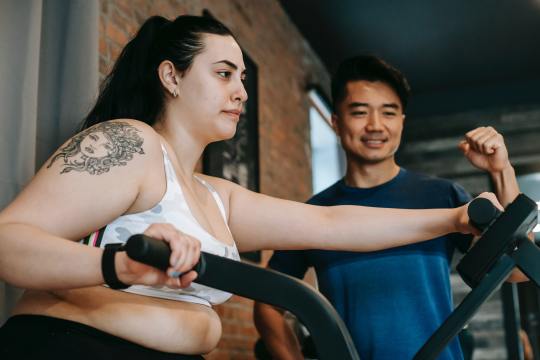Don't wanna be here? Send us removal request.
Text
How can you overcome emotional eating?
Emotional eating is a common issue where people use food to cope with their emotions, whether it's stress, anxiety, sadness, or boredom. Here are some strategies that may help you overcome emotional eating:
Identify triggers: Start by recognizing what triggers your emotional eating. Keep a journal to track your feelings, the food you eat, and the situations in which you eat them.
Find alternative coping mechanisms: Instead of turning to food when you're feeling emotional, try other activities that can help you manage your emotions, such as exercise, reading, or talking to a friend.
Practice mindfulness: Pay attention to your body's hunger and fullness signals. Mindful eating involves being fully present and aware of the food you're eating and the sensations in your body.
Create a healthy eating environment: Stock your kitchen with healthy foods that you enjoy, and remove any unhealthy foods that may trigger your emotional eating.
Get support: Consider joining a support group or working with a therapist to address underlying emotional issues that may be contributing to your emotional eating.
Practice self-compassion: Remember that changing your eating habits takes time and effort. Be kind to yourself and celebrate small successes along the way.
Remember, overcoming emotional eating is a journey, and it's okay to stumble along the way. Be patient and persistent, and you can make progress towards a healthier relationship with food and your emotions.
6 notes
·
View notes
Text
Benefits of a Keto Diet Plan for Weight Loss
At some point in our lives, we all struggle with losing weight. It can be challenging and frustrating, especially when we try different diets without seeing significant results. However, a Keto diet plan has proven to be a successful weight loss method for many people. In this article, we will explore the benefits of a Keto diet plan for weight loss and how it can help you achieve your desired body weight.

What is a Keto Diet Plan?
A Keto diet plan is a low-carb, high-fat diet that involves reducing carbohydrate intake and replacing it with fat. The main goal of a Keto diet plan is to put the body into a state of ketosis, where it burns fat for energy instead of glucose. To achieve ketosis, the body must consume fewer than 50 grams of carbohydrates per day. This results in the body producing ketones, which are used as an alternative energy source.
Benefits of a Keto Diet Plan for Weight Loss
Appetite Suppression
A significant advantage of a Keto diet plan is that it can help suppress appetite, which leads to fewer cravings and reduced calorie intake. Since a Keto diet plan is high in fat and protein, it helps you feel full for longer periods, making it easier to stick to your weight loss goals.
2. Increased Fat Burning
A Keto diet plan promotes fat burning by putting the body in a state of ketosis. When the body is in ketosis, it burns stored fat for energy instead of glucose. This results in rapid weight loss, especially in the first few weeks of the diet.
3. Improved Insulin Sensitivity
A Keto diet plan has been shown to improve insulin sensitivity, which is beneficial for people with type 2 diabetes or prediabetes. Insulin sensitivity refers to how well the body responds to insulin, the hormone responsible for regulating blood sugar levels. By improving insulin sensitivity, the body can better regulate blood sugar levels, which can lead to improved weight loss results.
4. Reduced Inflammation
A Keto diet plan has anti-inflammatory properties that can help reduce inflammation in the body. Inflammation can lead to weight gain and other health problems such as arthritis, diabetes, and heart disease. By reducing inflammation, a Keto diet plan can help you achieve your weight loss goals and improve your overall health.
5. Improved Energy Levels
A Keto diet plan can also help improve energy levels. When the body is in ketosis, it burns fat for energy, which provides a more stable and long-lasting source of energy compared to glucose. This results in improved mental clarity, focus, and productivity, making it easier to stick to your weight loss goals.
6. Lower Cholesterol Levels
A Keto diet plan can help lower cholesterol levels, which is beneficial for people with high cholesterol or other cardiovascular risk factors. A Keto diet plan involves reducing carbohydrate intake, which can help reduce triglyceride levels and increase HDL (good) cholesterol levels.
7. Reduced Risk of Chronic Diseases
By promoting weight loss and reducing inflammation, a Keto diet plan can help reduce the risk of chronic diseases such as type 2 diabetes, heart disease, and cancer. A Keto diet plan can also help improve overall health and well-being, leading to a healthier and happier lifestyle.
8. Conclusion
In conclusion, a Keto diet plan is an effective and sustainable weight loss method that offers numerous health benefits. By suppressing appetite, promoting fat burning, improving insulin sensitivity, reducing inflammation, improving energy levels, lowering cholesterol levels, and reducing the risk of chronic diseases, a Keto diet plan can help you achieve your weight loss goals and improve your overall health. If you are considering a Keto diet plan, it is essential to consult with a healthcare professional to ensure that it is suitable for your individual needs and health status LEARN MORE
#Keto diet#Health and wellness#Nutrition#Weight loss#low-carb#Healthy eating#Meal planning#Fitness#Lifestyle#Metabolism#Body composition#Fat loss#Meal prep#Ketosis
1 note
·
View note
Text
10 Benefits of the Keto Diet

The ketogenic diet, or keto for short, is a high-fat, low-carbohydrate diet that has gained a lot of popularity in recent years. It has been praised for its ability to help people lose weight, improve their energy levels, and even help control certain medical conditions. In this article, we will be discussing the top 10 benefits of the keto diet and how it can help improve your overall health and well-being.
Weight Loss
One of the primary benefits of the keto diet is weight loss. By reducing your carbohydrate intake and increasing your fat intake, your body enters a state of ketosis where it burns fat for fuel instead of glucose. This can lead to significant weight loss, especially in the first few weeks of the diet.
2. Increased Energy Levels
Another benefit of the keto diet is increased energy levels. When your body is burning fat for fuel instead of glucose, it produces ketones which provide a more sustained and stable source of energy. This can help you feel more energetic throughout the day and avoid the energy crashes that can come from consuming high-carbohydrate foods.
3. Improved Mental Clarity
The keto diet has also been shown to improve mental clarity and cognitive function. Studies have found that ketones can provide a more efficient source of fuel for the brain, leading to improved focus, concentration, and mental clarity.
4. Reduced Inflammation
Inflammation is a major contributing factor to many chronic diseases, including heart disease, diabetes, and cancer. The keto diet has been shown to reduce inflammation in the body by reducing the production of inflammatory markers and improving antioxidant levels.
5. Lowered Blood Sugar and Insulin Levels
The keto diet can also help lower blood sugar and insulin levels, making it a useful tool for people with type 2 diabetes or insulin resistance. By reducing carbohydrate intake, the body requires less insulin to manage blood sugar levels, which can lead to improved glucose control and reduced insulin resistance.
6. Improved Heart Health
The keto diet has been shown to improve heart health by reducing cholesterol and triglyceride levels, both of which are risk factors for heart disease. In addition, the diet has been shown to reduce blood pressure and improve arterial function.
7. Reduced Risk of Certain Cancers
There is evidence to suggest that the keto diet may help reduce the risk of certain cancers, including brain and prostate cancer. This is thought to be due to the diet's ability to reduce inflammation and improve antioxidant levels in the body.
8. Improved Skin Health
The keto diet may also have benefits for skin health. Studies have found that the diet can reduce the severity and frequency of acne, as well as improve the overall appearance of the skin.
9. Increased Longevity
Some research suggests that the keto diet may increase longevity by reducing oxidative stress and inflammation in the body. These are both factors that contribute to aging and age-related diseases.
10. Improved Athletic Performance
Finally, the keto diet has been shown to improve athletic performance in certain situations. By providing a more sustained and stable source of energy, the diet can help athletes avoid the energy crashes that can come from consuming high-carbohydrate foods. In addition, the diet has been shown to increase fat oxidation during exercise, which can lead to improved endurance and performance.
In conclusion, the keto diet offers numerous benefits for those looking to improve their health and well-being. From weight loss and increased energy levels to improved heart health and athletic performance, the diet has something to offer for everyone. If you're considering trying the keto diet, be sure to talk to your doctor or a registered dietitian to ensure that it's right for you.
#weight loss#keto#keto diet#ketosis#low-carb diet#fitness#health & fitness#Fat oxidation#Antioxidants#Longevity#Low-carbohydrate diet#Energy levels
0 notes
Text
The Ultimate Guide to Long Distance Running for Weight Loss
Running is an effective way to burn calories and lose weight. However, it is important to do it the right way, to avoid injury and to achieve your weight loss goals. In this guide, we will cover everything you need to know about long-distance running for weight loss, including training, nutrition, and recovery.

1. Set Realistic Goals
Before starting any weight loss journey, it is important to set realistic goals. Running a marathon might be too ambitious if you are just starting out. Start by setting small goals such as running for 20 minutes, three times a week, and gradually increase your distance and frequency. Setting realistic goals will keep you motivated and help you avoid injury.
2. Get the Right Gear
Having the right gear is important when it comes to running. Invest in a good pair of running shoes that fit well and provide adequate support for your feet. It is also important to wear breathable clothing that is appropriate for the weather conditions. If you are planning to run in low light conditions, consider getting reflective clothing or gear.
3. Plan Your Training
Planning your training is important to ensure that you progress gradually and avoid injury. Start by incorporating short runs into your routine and gradually increase your distance and frequency. Aim to run at least three times a week, and try to vary your route to keep things interesting. It is also important to incorporate cross-training activities such as strength training and yoga to improve your overall fitness.
4. Pay Attention to Nutrition
Nutrition plays a crucial role in weight loss and long-distance running. Make sure you are eating a balanced diet that includes complex carbohydrates, lean protein, and healthy fats. Avoid processed foods and sugary drinks, and drink plenty of water to stay hydrated. It is also important to fuel your body before and after your runs with healthy snacks such as fruits, nuts, and yogurt.
5. Practice Good Recovery
Habits Recovery is just as important as training when it comes to long-distance running. Make sure you are taking rest days and getting enough sleep to allow your body to recover. Stretching and foam rolling can also help to prevent injury and speed up recovery. If you do experience any pain or discomfort, it is important to seek professional advice and take the necessary time off to recover.
6. Join a Running Group or Hire a Coach
Joining a running group or hiring a coach can help to keep you motivated and provide you with valuable guidance and support. Running with others can also make your training more enjoyable and help you achieve your goals faster. If you prefer to train alone, consider using a running app or joining an online community to stay connected and motivated.
In conclusion, long-distance running can be an effective way to lose weight, but it is important to do it the right way. By setting realistic goals, getting the right gear, planning your training, paying attention to nutrition, practicing good recovery habits, and joining a running group or hiring a coach, you can achieve your weight loss goals and enjoy the many benefits of running. Good luck on your weight loss journey!
#weight loss#Running#Jogging#Trail running#Treadmill running#Running motivation#fitness#Sprinting#exercise
1 note
·
View note
Text
Unveiling the Surprising Benefits of a 30-Day Keto Diet Challenge

Because of its potential for weight loss and other health advantages, the keto diet is a low-carb, high-fat eating plan that has gained popularity. Although there may be some advantages to the diet, there are also hazards, and it may not be suitable for everyone. Those who want to lose weight, enhance their general health, or manage specific medical disorders like diabetes or metabolic syndrome can consistently adopt the keto diet. It might also be appropriate for athletes or fitness enthusiasts who want to use fat adaption to increase their performance and endurance. Click here to know more
#Keto diet#Low-carb diet#High-fat diet#Weight loss#Health#Nutrition#Meal planning#Healthy fats#Carbohydrates#Ketosis#Metabolic state#Energy levels#Blood sugar#Insulin resistance#Diabetes#Heart health#Brain health#Fitness#Registered dietitian#Meal prep
1 note
·
View note
Text
Is it normal to gain weight before losing?
When you start a new exercise program or change your diet, your body goes through a variety of changes. One of the most common causes of weight gain before losing weight is water retention. As you begin to exercise, your muscles may become inflamed, which can cause your body to retain water. This can lead to a temporary increase in weight on the scale.
In addition to water retention, your body may also begin to build muscle mass as you start to exercise. While muscle is denser than fat, it also weighs more. This means that you may see an increase in weight, even as you're losing body fat.
Another factor to consider is that many people tend to overcompensate for their workouts by eating more food. This can lead to an increase in calorie intake, which can offset any potential weight loss from exercise.
Here are 5 points:
1. Gaining weight before losing weight is a common phenomenon that happens when you start a new exercise program or change your diet.
2. This initial weight gain is usually caused by water retention and muscle building, which can increase your overall weight.
3. It's important to keep in mind that weight loss is a gradual process, and it may take time to see significant results.
4. achieve weight loss goals, it's important to follow a healthy diet and exercise regularly, as well as to be patient and persistent.
5. If you're concerned about your weight or are struggling to lose weight, it's a good idea to consult with a healthcare professional or a registered dietitian who can provide you with personalized advice and support.
1 note
·
View note
Text
Does Slow Down Your Weight Loss On The Ketogenic Diet?
The ketogenic diet, or "keto" for short, causes the body to convert from burning carbohydrates to burning fat for energy, which might cause weight loss to start off quickly. However, weight loss may slow down or even plateau as the body adjusts to this new metabolic state. There are a number of reasons why this occurs and actions that can be taken to keep weight loss moving in the right direction, which can be difficult for those who are attempting to lose weight on the keto diet.
1. Body Adapts To The New Metabolic The State:
2. Insufficient Calorie Deficit:
3. Lack Of Physical Activity:
4. Hidden Carbohydrates:
5. Hormonal disorders:
MORE DETAILS CLICK HERE
#ketogenicdiet#weightloss#slowingdown#lowcarb#lowcarbhighfat#keto#ketosis#ketogeniclifestyle#calorierestriction#intermittentfasting#nutrition#dieting
2 notes
·
View notes
Text
10 Ways to Lower Your Cholesterol
Here are 10 ways to lower your cholesterol;
1. Eat a heart-healthy diet: Focus on eating plenty of fruits, vegetables, whole grains, and lean proteins. Avoid foods that are high in saturated and trans fats.
2. Get regular exercise: Aim for at least 150 minutes of moderate-intensity exercise per week. This can include activities like brisk walking, cycling, or swimming.

3. Lose weight if you're overweight: Even a small weight loss can help lower your cholesterol.
4. Don't smoke or use tobacco products: Smoking can raise your LDL (bad) cholesterol and lower your HDL (good) cholesterol.
5. Limit your alcohol intake: Drinking too much alcohol can raise your triglycerides and LDL cholesterol.
6. Take cholesterol-lowering medications as prescribed: If your doctor has prescribed medication to lower your cholesterol, be sure to take it as directed.
7 Get your cholesterol checked regularly: It's important to have your cholesterol checked regularly so you can track your progress and make any necessary lifestyle changes.
8. Manage stress: Chronic stress can lead to unhealthy behaviors, such as overeating and not exercising, which can raise your cholesterol.
9. Get enough sleep: Lack of sleep can lead to weight gain and other health problems that can raise your cholesterol.
10. Consider adding plant sterols and stanols to your diet: These compounds, found in foods like nuts and seeds, can help lower your cholesterol levels.
It's important to note that everyone's cholesterol-lowering needs are different, and it's best to consult with a healthcare professional to determine the best course of action for you. MORE DETAILS
#cholesterol#health#cholesterol Diet#lower cholesterol#reducecholesterol#cholesterol exercise#cholesterol free food
2 notes
·
View notes
Text
In 2023, weight loss supplements will be used
There are a variety of supplements that are marketed as aids for weight loss. However, it is important to note that while some of these supplements may have the potential to help with weight loss, they are not a substitute for a healthy diet and regular physical activity.

Here are some examples of supplements that are sometimes used for weight loss:
Protein supplements: High protein diets may help with weight loss by increasing feelings of fullness and reducing appetite. Protein supplements can be a convenient way to increase your protein intake, but it is important to choose a product that is of high quality and fits into your overall diet. Protein supplements are dietary supplements that contain concentrated sources of protein, such as whey, casein, soy, or pea protein. These supplements are typically available in the form of powders, shakes, or bars, and can be used to help increase protein intake, either as a meal replacement or as an addition to meals.
Protein is an essential nutrient that plays a number of important roles in the body, including building and repairing tissues, producing enzymes and hormones, and maintaining healthy bones. Adequate protein intake is especially important for athletes and people who are trying to build muscle mass.
Some research suggests that protein supplements may be helpful for weight loss by increasing feelings of fullness and reducing appetite. However, it is important to note that protein supplements are not a substitute for a healthy diet and regular physical activity. To achieve long-term weight loss, it is important to focus on a balanced diet that includes a variety of nutrient-dense foods, as well as regular physical activity. CLICK HERE FOR MORE DETAILS
1 note
·
View note
Text
Which Is The Best Practice of Weight Loss?
There is no one "best" way to lose weight, as the most effective weight loss plan for one person may not be the best for another. However, there are some general principles that are generally accepted as being beneficial for weight loss. These include:
Incorporating regular physical activity: Engaging in regular physical activity can help you burn calories, improve your fitness, and boost your overall health. Aim for at least 150 minutes of moderate-intensity or 75 minutes of vigorous-intensity activity per week, or a combination of both.

Eating a healthy, balanced diet: A healthy diet that is low in calories, saturated and trans fats, and added sugars and high in fruits, vegetables, and lean proteins can help you lose weight and improve your overall health.
Monitoring portion sizes: Paying attention to portion sizes can help you control your calorie intake and prevent overconsumption.
Staying hydrated: Drinking enough water can help you feel full, reduce cravings, and improve your overall health.
Seeking support: It can be helpful to have the support of friends, family, or a healthcare professional as you work towards your weight loss goals.
It's important to remember that losing weight takes time and effort, and it's not always easy. It's important to be patient and consistent, and to find a weight loss plan that works for you and that you can stick to long-term.
More details https://tinyurl.com/2p9ax4ut
1 note
·
View note
Text
How Weight Loss Pills Work!
Weight loss pills are a type of dietary supplement that is intended to help people lose weight. These pills may contain a variety of ingredients, such as herbs, fiber, and minerals, which are thought to help with weight loss in various ways.

Some weight loss pills are designed to help suppress appetite, while others may work by increasing metabolism or reducing the absorption of fat in the body. Still others may work by increasing the body's fat-burning capabilities, or by decreasing the amount of fat that is stored in the body.
It's important to note that weight loss pills are not a magic solution to weight loss, and they are not intended to replace a healthy diet and regular exercise. While some weight loss pills may have some mild effects on weight loss, they are generally not very effective on their own and should not be relied upon as the sole method for weight loss.
If you are considering taking weight loss pills, it's important to consult with a healthcare professional, such as a doctor or a registered dietitian, to determine if they are appropriate for you and to discuss any potential risks or side effects.
Healthy Diet And Regular Exercise

A healthy diet is an important part of a weight loss program and is essential for overall health and well-being. A healthy diet includes a variety of nutrient-dense foods from all food groups, including fruits, vegetables, whole grains, lean proteins, and healthy fats. It is also important to limit the intake of added sugars, salt, and unhealthy fats.
More Details bit.ly/3XMqZRO
In addition to following a healthy diet, regular physical activity is also important for weight loss and overall health. The Centers for Disease Control and Prevention (CDC) recommends that adults get at least 150 minutes of moderate-intensity aerobic activity or 75 minutes of vigorous-intensity aerobic activity per week, in addition to muscle-strengthening activities at least two days per week.
It's important to note that the specific amount of physical activity needed for weight loss will vary depending on a person's age, weight, and fitness level. Consult with a healthcare professional, such as a doctor or a registered dietitian, to determine the appropriate amount of physical activity for your needs and goals.
#weight loss#how to lose weight#lose stomach weight#self esteem#weight loss low carb diet#whole foods diet#weight loss meal plan#low carb recipes weight loss#weight goals
1 note
·
View note
Text
Does Belly Fat Go Away First
When you lose weight, your body breaks down fat stores all over your body, including in your belly. However, it's not possible to target specific areas of your body for fat loss. If you're trying to lose belly fat, it's important to focus on overall weight loss by making healthy lifestyle choices, such as eating a healthy diet and getting regular exercise. This can help you lose fat from all over your body, including your belly.

When you lose weight, your fat cells shrink in size. However, the number of fat cells in your body remains the same. This is why it's possible to regain weight after losing it. To maintain weight loss, it's important to continue to make healthy lifestyle choices on an ongoing basis.
It's also worth noting that everyone's body is different, so the rate at which you lose weight and where you lose it from may vary. Some people may see more noticeable changes in their belly fat than others when they lose weight.
Click here for details
2 notes
·
View notes
Text
How Weight Loss Change Life !
Losing weight can have a significant impact on your life, both physically and mentally. Here are some ways that weight loss can change your life:

Improved physical health: Losing weight can improve your overall physical health, as it can help to lower your risk for a variety of health conditions such as obesity, diabetes, heart disease, and high blood pressure.
Increased energy levels: As you lose weight, you may find that you have more energy and are able to engage in physical activities that you may have previously found difficult or tiring.
Improved mental health: Losing weight can also have a positive effect on your mental health, as it can help to reduce feelings of depression and anxiety, and improve your self-esteem and body image.
Better sleep: Losing weight can also improve your sleep quality, as excess weight can contribute to sleep apnea and other sleep disorders.
Improved social life: Losing weight can also improve your social life, as you may feel more confident and self-assured, which can lead to more social interactions and increased participation in activities you enjoy.
#weight loss#how to weight loss#self esteem#body image#weight loss low carb diet#weight loss meal plan
5 notes
·
View notes
Text
Weight Loss Without Exercises
Losing weight without exercise is possible, but it can be difficult and may not be the most effective or healthy way to achieve your weight loss goals. Here are a few tips for losing weight without exercising:
Eat a healthy, balanced diet: Focus on eating plenty of fruits, vegetables, lean proteins, and whole grains, and limit your intake of processed foods, sugary drinks, and unhealthy fats.
Keep track of your food intake: Use a food diary or a calorie tracking app to help you stay aware of how much you're eating and make sure you're not consuming more calories than you're burning.
Stay hydrated: Drink plenty of water, as it can help you feel full and may also increase your metabolism.
Get enough sleep: Lack of sleep has been linked to weight gain, so make sure you're getting enough rest each night.
Find ways to reduce stress: Chronic stress can lead to overeating and weight gain, so finding ways to manage stress, such as through meditation or yoga, can be helpful.
It's important to note that while it is possible to lose weight without exercising, regular physical activity has numerous health benefits and can help you achieve and maintain a healthy weight. It's a good idea to talk to a healthcare provider or a registered dietitian for personalized advice on how to achieve and maintain a healthy weight. Click here for more
#whole foods diet#weight loss low carb diet#weight loss meal plan#low carb recipes weight loss#weight goals#weightloss#how to weight loss
3 notes
·
View notes
Text
How Weight Loss Changes Your Face & Hips,,,
Your characteristics and unique physiology will determine where on your body you will typically put on the most weight, whether it is more on the hips and thighs or more in the centre. Regardless, whether or whether the majority of your body is an apple or pear shape, the more weight you gain, the more of it you will notice in front of you.
It's possible that you won't notice the signs of weight loss right away if you're thinking about what you'll look like if you lose weight. However, over time, your face's finish will deteriorate and you can appear more recognisable to yourself and those around you.
Weight loss can have a huge impact on your face, more so than you may realize. When you lose a significant amount of weight, it can cause your face to look very different than before. That’s because when you lose weight, your facial fat tends to decrease — and that can change the proportions, shape, and even the tension in the skin of your face.
When you decide to lose weight, there are usually good feelings and excitement over the positive changes you will make in your life. However, it’s important to be prepared for some of the changes your face may go through during this process. While the effects may not be completely negative or positive, they may cause some emotional or physical turbulence.
The main way that weight loss affects the face is a decrease in the fat that’s stored in and around the face. This can lead to a gaunt, hollow-looking face. The chin and jaw may also become more defined due to the loss of facial fat. The other common result is loose and sagging skin. When you lose fat, the surrounding skin doesn’t shrink as much as the fat does and this can cause facial wrinkles and lines. Click here
#weight loss meal plan#weight loss low carb diet#weightloss#how to weight loss#self esteem#low carb recipes weight loss
1 note
·
View note
Text
How Weight Loss Changed My Life
It's true that I had always been a skinny person. I could remember being around 100 pounds in grade school, and it took me years to finally reach high school and overcome my fear of gaining weight. Weight was something other people worried about, not me – I was naturally thin and never needed to diet or think about my body image or what clothes to wear. I grew up eating, drinking, and being a rather energetic child. I moved to San Francisco in the late 1990s, and though I had heard that San Francisco was a "healthy" place to live (and no wonder with all the fresh produce and organic food!), I didn't totally believe it.
I was about to find out that the city was for real. I moved there in my early 20s, working as a software engineer and living on a high but steep hill in the east end of the city. Like many San Franciscans, I walked everywhere – to work, to restaurants, even to parties. And because of my hectic schedule and packed apartment, I didn't have time or space for a car. So I lived a very active life.
I was never a good eater, but I didn't really start my weight-loss journey until after I became pregnant in 2002. I had an unplanned pregnancy at the age of 25 and decided to try to make it work by following the advice of my midwife, who said that I should eat right and exercise. She also recommended that each week I lose a pound and record how much weight I lost. She told me that each week would be easier than the previous one – because while it's hard to break old habits, it gets easier every time you do it.
Clik here for more
#weight loss#how to weight loss#low carb diet#body image#weight loss meal plan#flat stomach#weight goal
1 note
·
View note
